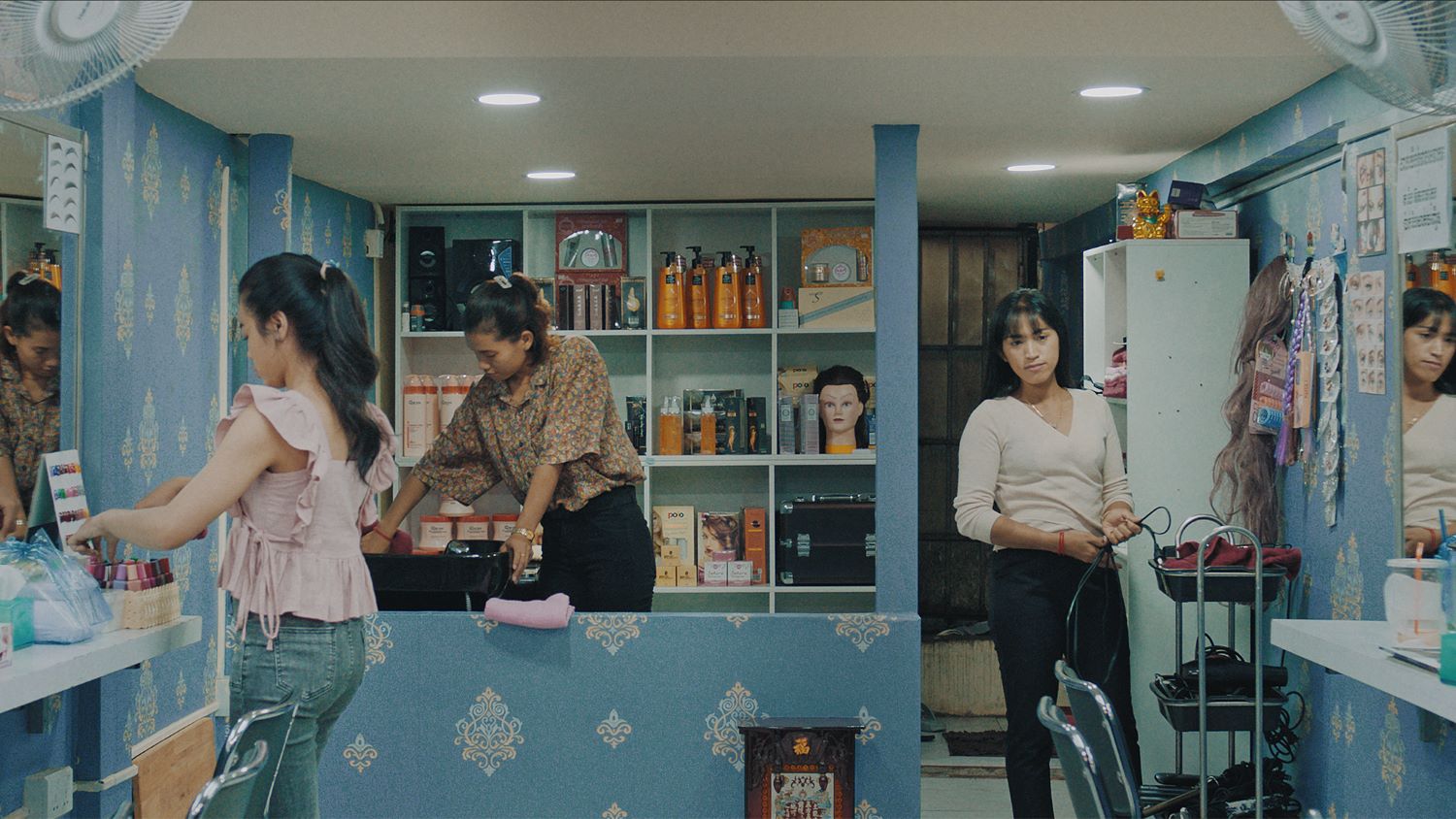Film Text: Sunrise In My Mind
Film Text: Sunrise In My Mind

Sunrise In My Mind
By Susannah Gruder
The wistfulness at the heart of Danech San’s short film, Sunrise in My Mind, barely makes itself known. It’s not a plaintive yearning, but more of a meditative, dreamy headspace—subtly embodied by a hairdresser and a delivery man at the end of their evening shifts in Phnom Penh. Pich (Chhem Madeza) seems lost in a daze as she washes a client’s hair, her fellow stylists teasing her about her “crush,” Lay, a delivery man (Yorn Vicheka) who may or may not stop by before closing time. The women who work at the beauty parlor oscillate between attitudes of romance and cynicism—encouraging Pich’s fantasy while dispelling any rumors of passion in their own love lives.
San’s film is reminiscent of a more innocent era when men would court women, as they coyly shunned their advances—all part of a flirtatious game. While shot digitally, Sunrise in My Mind has a retro look that in its texture, hues, and depth could be mistaken for a film from another time. Ottowan’s ’80s hit “Hands Up” plays softly in the background at the shop, along with Cambodian love songs from the ’70s and ’90s. The film’s palette of pastel blues, purples, and pinks feels straight out of Chantal Akerman’s Golden Eighties, another film that chronicles the heartaches and hairstyles of an urban beauty parlor. There’s something about salons that evokes this spirit of longing—the staff help women get done up for dates all day, wondering when they’ll get swept off their feet themselves.
Between appointments, one stylist watches an old Cambodian film on her iPhone: “There should be no touching, just expressing feelings,” a director tells an actress in one scene. “If we don’t use our bodies, how can we show our love?” she responds. The question of physical love comes into play when Lay appears—apparently, as we learn, he comes by around this hour every day. This time, he says, he’d like to get his hair washed. The next sequence is a positively chill-inducing moment of visual and aural stimulation that puts Out of Africa’s hair-washing sequence to shame. Pich’s slow, intentional head massage is filmed from her POV as she moves her thumbs in circles around Lay’s forehead. Watching the scene is a bittersweet experience, especially now that the pandemic has forced us to forgo the simple pleasure of having our hair washed at the salon.
It’s easy to see why this experience sends the two of them into a surreal underwater reverie—the aspect ratio suddenly shrinks from widescreen to 4:3 and we watch as Pich and Lay lounge in a blue-tinged universe, holding hands as sweat drips down their bodies and an other-worldly synth score from Jérôme Harré takes over. The main action of Sunrise in My Mind seems to take place in this fantasy—here, Pich and Lay go from awkward teenagers to fully mature adults, able to express their affection. It’s as if the steady circles of Pich’s massage awaken a new side of them, pulsing a strange, shared energy through their minds and bodies. San’s first film, A Million Years, is centered around a dream sequence as well, and emanates a similar hazy atmosphere. Both films were made by Anti-Archive, a small Cambodian production company launched in 2014 that’s working to help rehabilitate the country’s independent film scene.
The immersive daydream that washes over the film is intoxicating; so much so that I was sent into a sort of trance, practically feeling Pich’s hands on my own scalp, shivers moving down my spine. When I asked San where the idea for this sequence came from, it turned out she had been inspired by the Japanese reality show Terrace House, which concocts its own world of romantic possibility by bringing six strangers together under the same roof. It’s a simple scene in the show: a cast member brings his date to the salon. “It was so sensual,” San said. “It gave me ideas that there are lots of ways to show intimacy and attraction on screen.” The film’s title speaks to this overpowering form of intimacy and the unexpected ways that fantasy can flood us with feeling—giving us the irrational ability to transform night into day.
